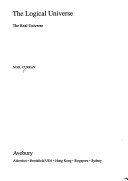Avebury Series in Philosophy
2 total works
The philosophy of mathematics presented in this book is based on the ideas of Sir William Rowan Hamilton on the ordinal character of numbers, the real numbers, scalar numbers, and the extension to vectors. The final extension is to Hamilton's quaternions. The algebra is interpreted as comprising of spin, or intrinsic angular momentum. This led the author to offer a new theory of time-space. This theory is based on the motion of spin, and not the motion of translation as in Einstein's special theory of relativity. The motion of spin is absolute, no frame of reference is required. If time is assumed to have a beginning it would be asymmetric with an arrow, this concept is applied to the laws of nature, which are symmetrical. The author argues that this is another Copernican Revolution in three respects: absolute time is restored, time has an arrow - is asymmetric, and thirdly the theory is based on the motion of spin which is absolute and more fundamental than the motion of translation.
The central concept of the system of philosophy developed in this text is that of meaning. This is applied to logic as a theory of meaning, rather than the proof theory of formal logic. Time is assymetric - an arrow. This concept is applied to the laws of nature which have no arrow of time. In the philosophy of mathematics the same emphasis is on meaning using the ideas of Sir William Rowan Hamilton on the ordinal character of numbers, the real numbers, the scalar numbers and the extension to vectors. The problem of God's existence is one of meaning - not proof. This is directly related to the concept of the universe having a beginning or being eternal. The logical universe - the cosmos - is conceived as one reality existing in space and time which is assymetric and corresponds to the real universe.

